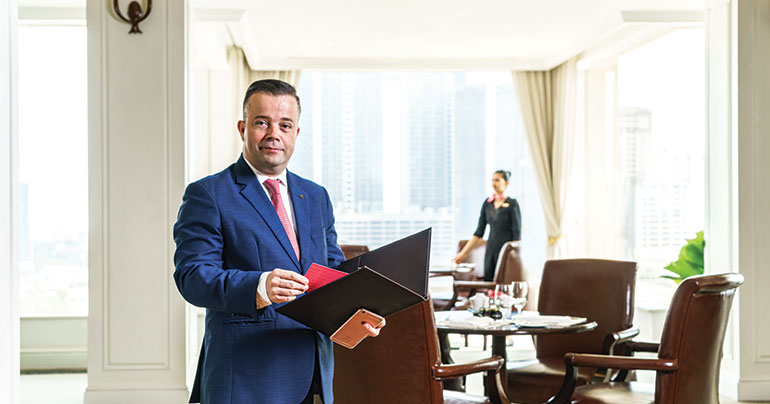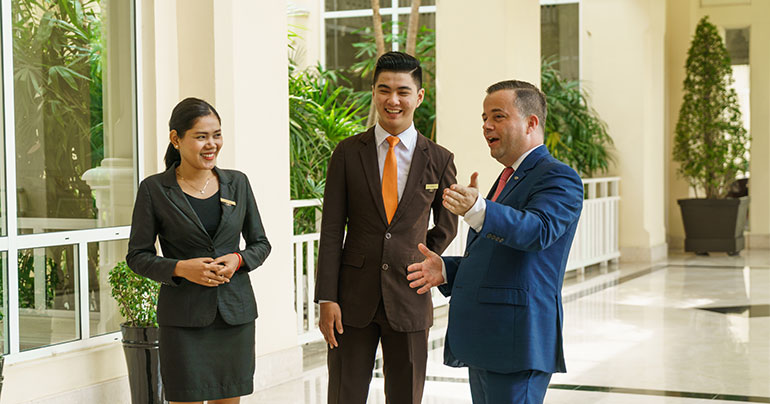Charles-Henri Chevet, general manager at Sofitel Phnom Penh Phokeetra and area general manager of Phokeethra hotels, which manages five properties across Cambodia and Thailand, discusses up-skilling staff and how Cambodia’s thriving hospitality sector can adapt to the country’s changing face as a tourist destination

How has Cambodia changed as a tourism destination during your decade in the Kingdom, and how has the hospitality sector adapted to accommodate that?
The first thing is volume – in just a couple of years the number of visitors and the number of tourists in Cambodia has grown significantly. It’s not becoming a mass market, but if we talk about pure leisure, mainly in Siem Reap, it’s becoming more of a mass market than it was before. The nationalities have also changed – if we talk about pure leisure again, not investors, we’ve probably switched from a majority of visitors from the US and Europe, more on the high end, and we’ve moved to Asia.
And in that there is a big surge from China – definitely the country is very China-friendly in all aspects. We know also the ability of China to drive their tourists; the authorities in China have this ability to orient and influence tourist destinations, and Cambodia right now has a green light from the big agencies in China.
What are some of the challenges of recruiting and training a workforce of skilled staff in Cambodia?
For Cambodia it’s a challenge, but this is not only a challenge for Cambodia. You have destinations across the region that have emerged very quickly, and you have a number of hotels on offer that has boomed over the past ten years in an incredible, unbelievable way. There are so many hotels, so many restaurants that it’s difficult to cope with the number of qualified people you need.
In Cambodia, it’s the same situation. If you look at Siem Reap, the hotel boom has been just unbelievable. A generation of staff has already been trained and are qualified and skilled in this business, but today the issue is that so many hotels continue to arrive, we might still be short in terms of qualified people. Phnom Penh is in the same situation. The surge has been very impressive, but there is a difficulty that comes with that. If we put it into perspective, there just are not many schools preparing a new generation on that. There are some new ones arriving, which is very good, but overall those schools are training a limited number of people every year, which we understand – it takes time, and you need enough teachers to train them. And I believe that companies like us, international or even some local big hotel organisations are also good schools, because we train a lot of our people.

How can hotels in Cambodia anticipate and respond to changing industry trends?
Hotels like us are operating 24 hours – there are always staff at least at the reception. So the idea is that the hotel is becoming a point of regular life – you can collect your laundry, you can have a convenience store or other elements where we could run 24 hours. This is one of the doors-open angles currently happening in Europe. Actually in Phnom Penh in this hotel we already have an outside laundry service, we have a sports club which is not dedicated particularly to hotel guests, it’s more for outside customers, and of course our restaurants are open to whoever wants to come. A big part of our clientele in our restaurants are coming from outside – they’re not hotel guests.
What traits do you look for in your staff?
Speaking a foreign language, that’s number one. To start more generally, we look for attitude or personality. So you might have someone who has no experience and has not been trained but in our business it might be interesting to look at him or her because of their personality. In this hotel [Sofitel Phnom Penh Phokeethra] we hire 400 people, so you have different needs, but in front of house or similar areas you are looking for personality first. We want people who are open, extremely reactive, understanding of what’s happening, anticipating. And having a great ability to talk, to entertain and to drive the business.
And after that, it’s the technical aspects. You can always train people. And people are learning because they want to – they know that it’s a condition of their success.
This article was first published in Globe Media Asia’s Focus Cambodia 2018 magazine.

